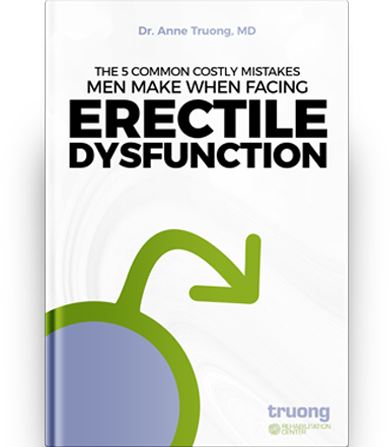There are ED Facts and ED myths. The facts reveal that erectile dysfunction is more common than we think. By starting with the medical definition of ED, it helps us understand what it is. Next, understanding the different causes, who is more likely to experience ED, and the potential side effects also help to diagnose and treat it.
ED Facts — Table Of Contents
- Defining ED
- ED Facts and Statistics
- Distinguishing Mental and Physical Causes of ED
- Broad Categories of ED Causes
- The Value of Knowing These ED Facts
- Links and Resources
Defining ED

In this episode, I will define what ED is and the many causes of ED. Some of you may know, and some of it you may be surprised to find out. Erectile dysfunction, or ED, is trouble attaining and sustaining an erection sufficient for satisfying sexual intercourse. ED is not simply failing to have an erection one night after you’ve had several drinks, or even for a week or more during a time of intense emotional stress. Nor is ED the inability to have an erection soon after orgasm. At least 25% of the time, the penis doesn’t get firm enough, or gets firm, but softens too soon.
ED develops gradually. One night, it may take longer, or require more stimulation to get an erection. And another time, an erection may not be as firm as usual, or it may end before orgasm. When this happens more than 50% of the time, or becomes a source of distress for you or your partner, then it is worrisome. It needs treatment.
ED Facts and Statistics

There’s a myth that if you have an erection, you may not have ED. That is not the case at all. Even though you have ED, you can still experience orgasm and ejaculation. That’s because erection and orgasm involve different muscles and nerves, and I’ll go over that in a little later episode. According to the National Institute of Health, ED affects some 30 million men in the United States. Worldwide, the number of men diagnosed with ED could reach an estimated 322 million by 2025. However, when it comes to ED statistics and research in this country, the gold standard continues to be a large study called the Massachusetts Male Aging Study, or the MMAS study. This study found that 43% of men, age 40 to 70, had some degree of ED from minimal to severe level.
In another study in 2012, in the American Journal of Men’s Health, they found that men under 40, 20% have ED. In men in the forties, 40% have ED. In men in the fifties, 50% have ED. In men in the sixties, 60% have ED. And in men in the seventies, 70% have ED. In men in the eighties, 80% have ED.
Often, erectile difficulties are the result of a medical condition that becomes more prevalent with age, or it may reflect the treatment of such a condition, such that erection difficulties are potential side effects of many medications, trauma, or surgeries in the pelvic region. In the past, most cases of ED were thought to be psychological in origin, or the result of factors such as performance anxiety, or more generalized stress. While this issue can cause ED, 80 to 90% of the time, the problem can be traced to physical conditions that restrict blood flow and hamper the nerve functioning or both. Often, the culprit behind ED is the insufficient blood supply to the penis because of clogged arteries, a condition called atherosclerosis.
In fact, in up to 30% of men who see their doctors about ED, the condition is the first sign that they have cardiovascular disease or disease of the heart and the blood vessels. In 2019, a review of a published research study found that men with ED have a 43% increased risk of heart disease, compared with men who do not have ED. This is very significant. So if there is a complete loss of nighttime erection, it is likely due to vascular or blood vessel disease or nerve disease.
Distinguishing Mental and Physical Causes of ED

ED usually develops from a mix of psychogenic and physical factors. How do you differentiate between mental or physical ED? Well, the psychological onset of ED is usually abrupt, and you can have nighttime erections. And it may occur with one partner, and you can get an erection with masturbation or with erotic stimuli other than intercourse. The physical cause of ED, the onset is usually gradual, no nighttime erection, and ED occurs with all partners and no erection with erotic stimuli.
Do you know that men typically have three to five erections per eight hours of sleep? And how do you know you have a nighttime erection? Well, you do the nocturnal tumescence test. This is a test to see if your erection may be caused by psychological issues. You wrap a piece of non-perforated, non-sticky tape around the penis before you go to bed. Then you go to sleep as usual. And then in the morning, you check to see if the tape has been broken. If the tape is broken, this might be a sign that you have a nighttime erection, but that you don’t necessarily have trouble with the physical creation of an erection, but you might have nonphysical issues, such as psychological.
Risk factors in men in the US over 40 years old for ED
- Race. Blacks are more at risk than Hispanics, and Hispanics are more at risk than white.
- Education level. If your education level’s less than high school, more at risk than those with high school and beyond.
- Marital status. Widows are the most at risk, followed by divorce and separated, followed by single, which is the least.
- Smoking status. Current smokers are the most at risk, followed by former smokers, followed by never smoking.
- A body mass index of over 30 is a risk factor. 30 BMI. And
- Blood pressure. Those that have treated blood pressure are actually more at risk than those with untreated blood pressure, compared to those that no blood pressure at all.
- High cholesterol, diabetes, history of heart disease, history of benign prosthetic enlargement, or BPH.
Six systems in your body enabling erections
The normal male sexual function involves a coordinated interplay between six systems in your body for erection to occur.
- Blood and blood vessels
- Hormones
- Emotions
- Nerves
- Brains
- Muscles
Broad Categories of ED Causes
So let’s go over the broad categories of physical causes of ED.
1. Vascular risk
Vascular risk factors for ED, such as heart disease, atherosclerotic disease-causing narrowing or clogging of the arteries in the penis, preventing the necessary blood flow to the penis to produce an erection. Hypertension, diabetes, high cholesterol, smoking, major surgeries such as prostate surgery, and radiation to the pelvis.
2. Neurological
Neurological factors for ED, such as spinal cord injuries and brain injury, Parkinson disease, Alzheimer disease, multiple sclerosis, Peyronie’s disease, scarring of the penis, penile fracture.
3. Hormonal
Hormonal factors, such as hypogonadism or low testosterone, hyperprolactin, hyper- and hypothyroid, hyper- and hypo cortisol release, diabetes, adrenal disorders, chronic liver disease, chronic kidney failure and AIDs.
4. Drug-induced causes
Drug-induced causes of ED. This account for a quarter of ED cases. Some are over the counter medication like anti-ulcer medication, antihistamine. Medications such as Pepsid, Tagamet, Zantac, high blood pressure medicine such as diuretic, beta blockers. One of the top reasons why men stop medication, especially high blood pressure medicine, because of the side effect of ED. Next is antidepressant, such as Zoloft, Paxil, Celexa, Prozac, amitriptyline, antipsychotic, antiandrogen such as Proscar, recreational drug, opioid pain medication.
5. Psychogenic
Psychogenic factors, such as performance anxiety, past traumatic experiences, relationship problems, anxiety, and depression. Stress.
6. Lifestyle
Lifestyle factors, such as obesity, smoking, lack of sleep. You need at least seven hours of sleep. Sedentary activity or no exercise, obstructive sleep apnea, Restless Leg Syndrome.
7. Other factors
Other factors, such as systemic sclerosis or scleroderma, and Peyronie’s disease. Prostate cancer treatment, such as at brachytherapy, or radiation, or even prostate surgery. Interestingly, the frequency of sexual activity is a predictor of ED. So men who have sex less than once a week develop ED at twice the rate as men who had sex more than once a week. So like your muscles, the more you use it, the better it is. So I recommend having sex at least two to three times a week.
The Value of Knowing These ED Facts

To summarize ED facts, an erection occurs when there is a balance between mental and physical state, but it would be misleading to regard ED as strictly one or the other, either psychological or physical. Often, both contribute to ED. In fact, more than 80% of men who have of ED as a reaction to an underlying physical illness go on to develop psychological issues that further hamper erection. For example, a man may develop ED as a side effect of a medication, and then become so anxious about his sexual performance, that he continues to have trouble with erection, even after he stopped the medication.
So in the next episode, I will dive deeper into the vascular causes of ED, or low blood flow, nerve damage, smoking, alcohol, diabetes, obesity, and bicycling.
Links and Resources
Thanks for listening, watching or reading.
- Be sure to go to my website at sexualhealthformenpodcast.com for more resources.
- And remember to join my men’s club at men1.club, a place where I help a community of men regain their sexual confidence.
- Check out my book on Amazon
If you like the show, I would appreciate it if you subscribe, leave a review on Apple Podcasts or wherever you listen. And know that you have sexual vitality for life.











